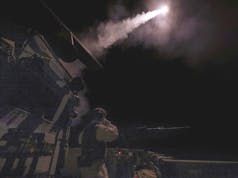In this episode, the panel discuss recent events in the Middle East, particularly the protests in Iran, political turmoil in Iraq and the possibility of a peace deal between Israel and Lebanon. They also discuss North Korea’s missile and nuclear projects and a round-up of the recent news from the Ukraine-Russia war.
You can listen here or find the podcast on most audio streaming platforms, including Spotify and TuneIn. We’ve also included a link to all the episodes on this page if that’s easier for you.
This episode features @Osinttechnical with @DefenceGeek and guest Aleph @no_itsmyturn.
An analyst on the defence and security podcast has said that there are a lot more civilian targets in Ukraine than military ones, and the Russians will continue to target them.
Renowned open-source intelligence specialist @Osinttechnical said:
“Iranian-supplied drones and Iranian-supplied assets have replaced the existing or depleted stock of Russian cruise missiles and other long-range assets. I don’t think there have been Russian calibre strikes for weeks now. It’s at a very significantly declined rate. So we’re very likely to see sort of this reduction and this, this lack of, of attacks. Moving into the future, these strikes against Ukrainian civilian targets, against civilian infrastructure, especially power generation infrastructure, are aimed at disturbing the ability of the Ukrainian Homefront to actually operate for people to go around their daily lives for the past few months before these resumed, these renewed strikes started, people were effectively living a normal life.
There were, you know, wartime considerations, but people were able to work, people were able to sort of actually live and operate, and Russia, obviously with their new Iranian supplied drones, their Iranian supplied strike assets are attempting to disturb that and attempting to sort of end that normalcy for the civilians in Ukraine.
I expect that to continue, and I expect them to, especially if they acquire these ballistic missiles from Iran, a strike targets even deeper into Ukraine, and it’ll be even harder for the Ukrainians to actually counter it, which certainly is a threat for the Ukrainians that I, you know, they might be able to counter it, they might not be able to counter it. Right now, their current air defence assets are able to counter a number of the drones and various weapons that the Russians are sending.
But again, just due to the nature of those swarming attacks, and of those saturation attacks, they’ll saturate, you know, any sort of integrated air defence network, which the Ukrainians are trying to put together right now to, you know, protect against civilian targets. There are a lot more civilian targets in Ukraine than military ones, and the Russians will continue to target them.”
You can listen for yourself by clicking here.
What is the OSINT Bunker?
The OSINT Bunker is a defence and security-based podcast aimed at expanding people’s knowledge of the geopolitical landscape using open-source intelligence. It fills a niche that most people (most people reading this anyway) have for up-to-date, accurate and balanced information on ongoing conflicts.
What is OSINT? For those who don’t know, OSINT stands for open-source intelligence, which refers to any information gathered from public sources about an organisation, event, individual etc. In practice, that tends to mean information found on the internet, but technically any public information falls into the category of OSINT, whether it’s books or reports in a public library, articles in a newspaper or statements in a press release.
Episodes typically cover the UK and international defence matters.














Hmmm…since the Mullahs are so damned anxious to stir the pot in UKR by providing arms the slobbering Orcs, why not initiate a quid pro quo counterstroke wherein the West supplies arms to Iranian dissidents to level the playing field vs. IRGC? Turnabout seems very fair play to me.